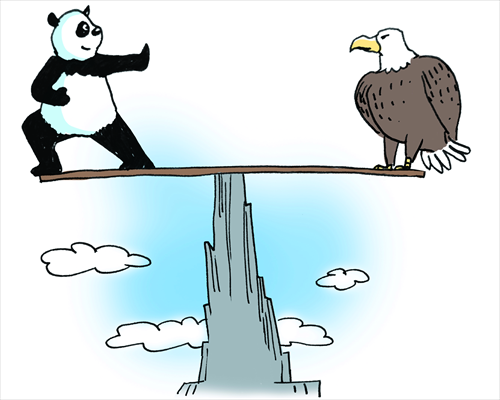


Illustration: Liu Rui/GT
The famous Thucydides' trap proposed by strategic thinker and former US national security advisor Zbigniew Brzezinski has often been mentioned by scholars, arguing the US and China are likely to fall into the trap. China is warned by the American political scientist to beware of the possible plight if it challenges the US and causes an open rivalry.
However, unlike 2,500 years ago, things have changed. Not all rising powers have to undergo a bitter role change in the world order. Zero-sum game is no longer the only option on the table for major powers. The latest example is the US which finished the hegemonic transition by receiving the scepter from the UK in a peaceful way. Both sides managed to avoid falling into the trap.
In fact, the real risks do not come from China intending to challenge the US, but from the reckless US rivalry against China in Asia-Pacific, which is obliged to take countermeasures in the same way. Despite some Chinese scholars' concerns that China should focus on the promotion of the "One Belt, One Road" initiative and avoid bearing the brunt of Washington's strong intervention in the South China Sea, China knows that its fallback in the South China Sea this time would eventually cause catastrophic consequences to the country's sovereignty and territorial integrity.
The salient reason for China holding fast to its claims in the South China Sea is because the region is one of the starting points of the "One Belt, One Road" initiative. As for the US, the sea is of strategic importance in Washington global strategy. Freedom of navigation is a mere fraction.
In Europe, Washington has managed to trigger a faceoff between the EU and Russia. By taking advantage of the Greek debt crisis, the US is engaged in a war of international finance with Europe. Meanwhile, Washington has tried different means to weaken China's competitiveness in the international community by taking advantage of China's territorial disputes with neighbors and meddling in China's internal affairs such as Hong Kong's political reform. However, none of these tricks has had a real effect.
The popularity of the China-led Asian Infrastructure Investment Bank (AIIB) is beyond the expectations of Washington, whose traditional allies have even turned their back on the US. The US' aggressive intervention in the South China Sea disputes follows its frustration in holding back the AIIB. In this case, China cannot back off. Otherwise, it will impair the public confidence in the Chinese government, and it will cause international investors' confidence in the Chinese market to falter.
It is possible that the next phase of Sino-US competition will be around the advancement of the "One Belt, One Road" strategy. A clear mind is needed before the competition becomes intense. Now, the global economy is still struggling to recover from the prolonged crisis, and everyone is trying their best to avoid getting worse instead of pursuing getting better.
In comparison, China's economic fundamentals are more robust than its counterparts elsewhere. The recent dramatic fall of the Chinese stock market is a test to evaluate the resilience of the Chinese economy. China can always find a way to hold its ground and steady its pace. China's outlook is still bright.
The author is a professor with the National Defense University of the People's Liberation Army.
 PLA soldiers eat raw snake meat in harsh training
PLA soldiers eat raw snake meat in harsh training Doctors use 3D-printed skull to save girl
Doctors use 3D-printed skull to save girl Yunnan-Myanmar Road: The past and present
Yunnan-Myanmar Road: The past and present Campus belle of Xiamen University gets popular online
Campus belle of Xiamen University gets popular online Who says moms cannot be trendy and hot?
Who says moms cannot be trendy and hot? 10 Chinese female stars with most beautiful faces
10 Chinese female stars with most beautiful faces Stunning photos of China's fighter planes
Stunning photos of China's fighter planes Eight fruits that defend men's health
Eight fruits that defend men's health  Top 10 secrets of longevity
Top 10 secrets of longevity Investors worried about impact from futures
Investors worried about impact from futures Accusations over GDP figures are frivolous
Accusations over GDP figures are frivolous Dream jobs: wiped workers recharge with power naps
Dream jobs: wiped workers recharge with power naps Chinese man throws birthday pool party for pet sea lion at luxury hotel
Chinese man throws birthday pool party for pet sea lion at luxury hotelDay|Week